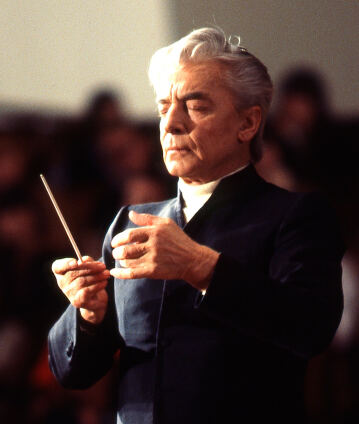Herbert von Karajan
Chef principal 1956-1989
L’un des concepts artistiques d’Herbert von Karajan consistait à combiner l’expressivité subjective de Wilhelm Furtwängler et la stricte objectivité d’Arturo Toscanini. De manière générale, le profil stylistique du chef d’orchestre semblait reposer sur un équilibre des contraires : épaisseur orchestrale et transparence, splendeur sonore et précision de l’articulation. S’il s’est fortement inspiré de modèles et de tendances existantes, Karajan demeure toutefois un phénomène unique dans le monde musical du XXe siècle.
Adorno voyait en Karajan le « génie du miracle économique ». Son train de vie spectaculaire, ses millions de disques vendus et sa contribution active au développement des technologies d’enregistrement semblent confirmer la remarque du philosophe. L’omniprésence médiatique de Karajan était cependant contrebalancée par une véritable humilité face aux chefs-d’œuvre de la musique et une formation solide de Kapellmeister acquise dès le début dans les maisons d’opéra d’Ulm et d’Aix-la-Chapelle. S’il nourrissait une prédilection pour Beethoven, Richard Strauss et Richard Wagner, le chef d’orchestre a cultivé autant à l’opéra qu’en concert un répertoire d’une diversité impressionnante. Aujourd’hui encore, ses enregistrements d’œuvres clés du modernisme français et de la Seconde École de Vienne font figure de références. Parmi les éclatantes réussites de Karajan en tant que chef principal des Berliner Philharmoniker, on compte la création du Festival de Pâques à Salzbourg et surtout l’inauguration de la Philharmonie, conçue par l’architecte Hans Scharoun en étroite collaboration avec le chef d’orchestre. Mais les dernières années de son mandat virent les conflits se multiplier et le chef d’orchestre finit par résilier son contrat avec l’orchestre quelques mois avant sa mort. Les 30 années d’alliance artistique entre les Berliner Philharmoniker et Herbert von Karajan demeurent néanmoins une période exceptionnelle qui rayonne aujourd’hui encore dans l’histoire de l’interprétation musicale.